In order to establish Industrie 4.0 in the company, the training and qualification of specialists must be adapted to the new challenges of the interdisciplinary approach. Festo Didactic's learning solutions close the gap between fundamental theoretical and practical experiential knowledge and enable learners to act competently.
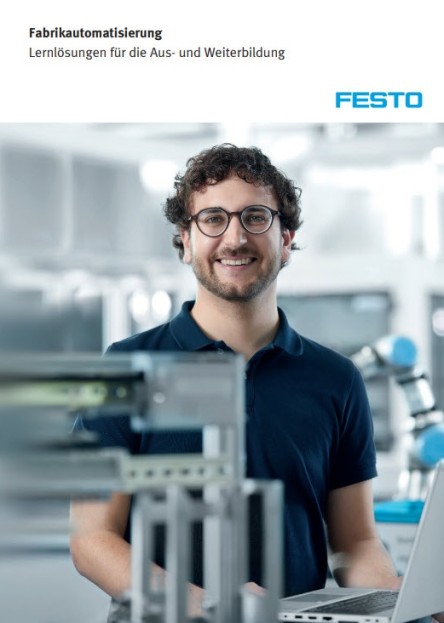
Check out our brochure
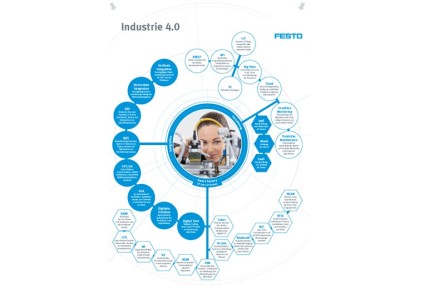
Terms Industry 4.0
The world of I 4.0 abbreviations ......
You have already dealt intensively with the topic of digitization and Industry 4.0 and have repeatedly discovered abbreviations that you first had to "Google". We have assigned and described the most common I 4.0 terms in this poster.
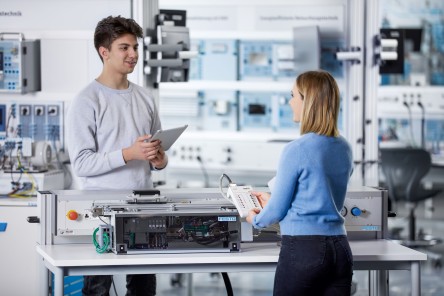
Commissioning and programming basics
Getting to know the most important components of actuators and sensors on the conveyor system and putting them into operation step by step - that's what our proven simulation box is for. So that this can also be used on the belt system, we use an adapter cable that enables the control not only of the PLC integrated in the belt, but also of external devices.
In a first step, the first 8 input/output signals can be controlled with the help of the simulation box, with Tec2Screen® or from FluidSim® P and the first logical steps can be completed. Of course, a small controller (e.g. LOGO) that is available in the basic area can also be used.
For the introduction to drive technology, a rotary encoder is installed in the belt system, the corresponding signals can be displayed via an oscilloscope or the Tec2Screen® and processed accordingly - learners can perform path detection, direction detection and simple positioning of the conveyor belt.
Matching the topics, we offer extensive task collections with project tasks on the basics of programming and HMI.
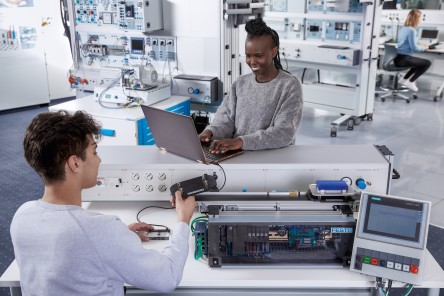
Sensor technology RFID/ Identification
Batch size 1 production and modular, customizable production are the buzzwords behind Industry 4.0. To fulfill both, controlling the production flow via intelligent sensors is necessary.
For this reason, we have also integrated a read/write RFID head into each of our CP Lab conveyor systems, enabling flexible production.
Would you like to get started with identification more easily?
Then use the sensors integrated in the belt system to detect material at the beginning or end of the belt - or work out the identification of pallets together with your trainees using 4-bit coding first. This is also a standard feature of our systems. Here, too, the following applies: from simple to complex - the conveyor system offers you a comprehensive learning environment - naturally including the appropriate learning materials for the described contents.
The belt system or the individual application modules can be individually equipped with further sensors.
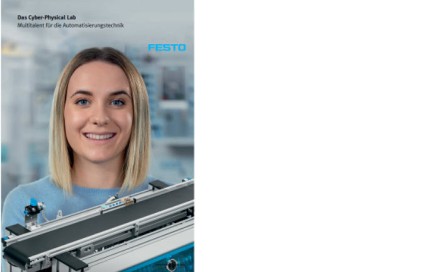
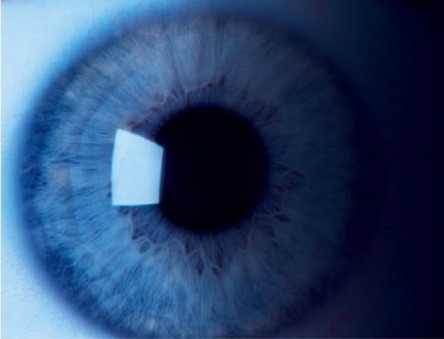
Would you like to learn more about our basic systems in the field of sensor technology?
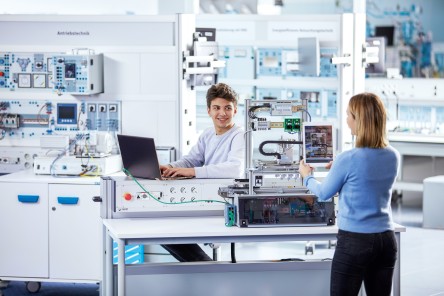
Augmented Reality - now also with display of live data from the plant
With the help of markers on individual parts of your hardware equipment and a mobile device, you can use Augmented Reality didactically profitable in your training.
AR is a digital tool that optimally supports the learners in getting to know the stations by displaying or retrieving information on individual installed parts, wiring diagrams, data sheets and documentation as required. In addition to our CP Lab or CP Factory systems, all you need is the free AR app (available for IOS and Android) and a suitable tablet.
Furthermore, you can not only call up prepared AR scenarios, but also develop your own ideas. For example, current parameters of your own plant can also be integrated within the AR environment - if, for example, the current temperature of the kiln is to be displayed via AR for the maintenance engineer before assembly. For this purpose, we provide you with predefined scenarios that are delivered with the system.

MES systems in the digital factory
The MES system (Manufacturing Execution System) is responsible for production planning and control and all this with a new service-oriented architecture.
For an easy entry into networked production, it is possible to first work with transition tables at the individual stations, even without an MES system, and thus learn a basic understanding of the communication of the stations via RFID.In a further step, a plant (real or as a digital image) is then connected to the MES system and customer and production orders are placed - thus topics such as communication and networking, product definition, data management or data evaluation as well as analysis and optimization of production planning can be taught. An MES system forms the bridge between the ERP systems used in the company and production.
Due to the open interfaces, webshops or even ERP systems can be integrated here.In combination with SAP4School as didactic ERP software and our MES4 V3 system, which has been tested for didactic suitability together with ZSL Baden-Württemberg, the processes no longer end with virtual orders, but can be transferred into didactic production orders at the learning factory.
Learn more about SAP4School
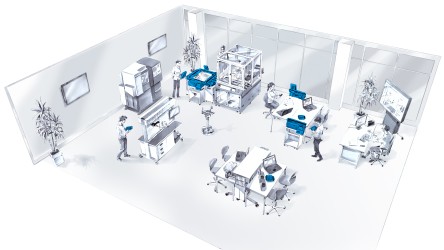
Our solutions for the partial innovation of M+E professions
The challenges in Qualification 4.0 are the development of competencies as well as flexible and adaptable concepts to deal with the changes. The goal should be to promote people's ability to act in a self-directed and goal-oriented manner in open, unknown and complex situations.
Digitalization is bringing unprecedented dynamics to human productive forces. As a result of the digital advancement of machines and artificial intelligence, people are also forced to change their thinking and actions accordingly.
This development requires competent people across all sectors who are able to shape requirements and developments in the professional and working world in a self-organized and creative manner and make adequate use of learning worlds, content, training and concepts as well as hardware.
The faster action goals, action methods and our knowledge change, the more we will be asked to develop new ideas in this chaos of open possibilities and to acquire skills to act in them in a self-organized and creative way.
New cross-border learning concepts, which directly reflect the new structures of our environment, will become a matter of course in education and training.
Qualification content that is fundamentally necessary in dealing with digital work in occupational profiles has been included in the common core qualifications of the aforementioned training regulations as the new occupational profile item 5 "Digitization of work, data protection and information security". Its content must be taught integratively throughout the entire training period.
CIROS®
The simulation software CIROS® is the virtual environment for PLC and robot programming as well as for plant simulation.
- PLC: The virtual models can be controlled by an integrated virtual PLC, from Step7 or the TIA Portal via PLCSim. Thus the basics of PLC programming can already be learned completely in the simulation. Furthermore, the specific installation of errors in the simulation models is also possible. Learners can carry out effective training in the event of faults already in the simulation environment.
- Robotics: Programming and realistic 3D simulation with CIROS® ensure that learners can safely handle robots and their work cells. Various ready-made models are available or users can also create models themselves. The created program and the corresponding position list can be tested completely virtually before the sequence is executed at the real robot station.
- Plant simulation: Various Industrie 4.0 learning systems are ready for you to practice production planning and control. Not only the real plant can be controlled from the MES system - the digital image can also be used for the exercises.
Learn more

CIROS® the digital image in factory automation
Experience the safe and location-independent use of our simulation environment CIROS® for PLC and robotics. Together we want to write a project for an Industry 4.0 conveyor system in the TIA Portal and run it on the CIROS model.
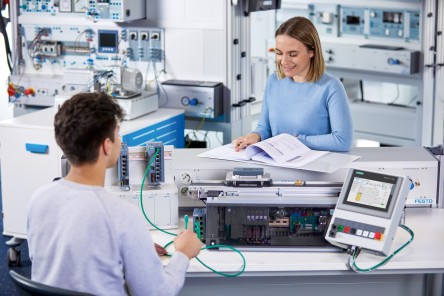
Networking and data security
At its core, Industry 4.0 is about providing previously passive building elements, components and machines with their own intelligence and networking them with each other. In this way, information and communication technology are to interlock and form a new quality in their interaction. For this reason, networking and also the security of the data to be exchanged in the process are of central importance in today's digital production plants.
The necessary contents are therefore also relevant for the newly structured computer science professions, as well as in the electronic technician/mechatronics technician professions affected by the partial amendment.With our training package, the basics are taught and the necessary skills can be trained with theoretical and practical tasks: Starting with the basics of networking, through switching, monitoring and routing to virtual local networks and firewall functions.
Equipment set TP1333: Networks and IT security
Do you want to collect, store and evaluate data? Then ask us about our IoT gateway or take a look at the next example of energy measurement and management.
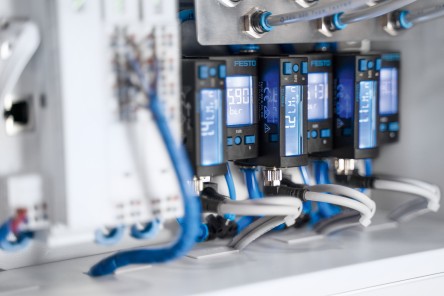
Energy measurement and management
How can energy consumption be measured and also managed? This is possible with our extension package for (almost) all learning systems.The energy measurement system with evaluation software is used for flexible and mobile energy measurement. The system is equipped with an energy measuring device for electrical energy and sensors for recording pressure consumption.
The measuring devices are connected to a CECC controller. This concentrates the energy data and sends it via OPC UA to the energy database for archiving and evaluation.
With the help of the energy monitoring software, the understanding, control and optimization of energy flows within a factory can be learned: Energy data is regularly retrieved from the controllers and stored in a database. Selection, analysis and export of the data are included as well as a modern visualization via WebServer.
Read more
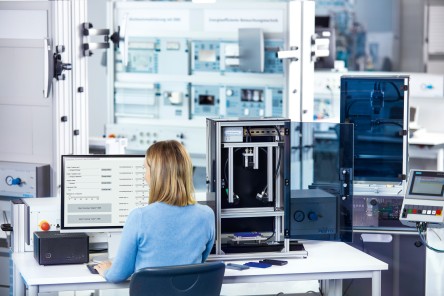
Machine learning/ AI
Nowadays, artificial intelligence (AI) is already used in numerous areas of industrial practice, for example, proactive maintenance based on a targeted evaluation of machine data and also the saving of resources through data-based process optimization. Machine Learning (ML), a sub-discipline of AI, has proven to be particularly promising in the analysis of data:
Using the standard production process of our learning factories, our "Machine Learning Vision" package can be used to perform an optical quality inspection of a workpiece with the camera module.
This is an algorithmic implementation with applications implemented in Python and following the concept of "Deep Learning".
Playfully and without programming knowledge, the first own ideas and products can be implemented, before the application can then of course be integrated in one of our learning factories.